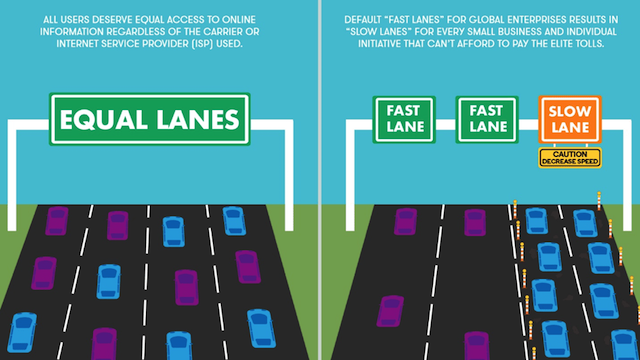Definition
Net neutrality is the principle that all data on the internet should be treated equally and be freely available to all users regardless of the device, application, or platform they use. In particular, it prevents Internet service providers (ISPs) from discriminating between online content by blocking content, speeding up or slowing down internet speeds when accessing specific websites, or charging extra money for customers to access websites that that ISP is not affiliated with or does not own.
History
In the United States, stringent net neutrality rules were first put in place in 2015 when the Federal Communications Commission (FCC) implemented the Open Internet Order, which established guidelines to protect the open Internet. The Open Internet Order prohibited blocking or paid
prioritization of online content, prevented website access from being unreasonably reduced, and provided for transparency into network practices. Additionally, it allows for these regulations by reclassifying Internet access service as a common carrier, or a service that is open to the genral public for an initial fee.
prioritization of online content, prevented website access from being unreasonably reduced, and provided for transparency into network practices. Additionally, it allows for these regulations by reclassifying Internet access service as a common carrier, or a service that is open to the genral public for an initial fee.
Later, in 2017, these rules were overturned when the FCC implemented the Restoring Internet Freedom Order that became effective the following year. The Restoring Internet Freedom Order reclassified internet access service as an information service that requires only light regulation. It found that transparency regarding network mangaement practices, performance, and terms of service would be sufficient to ensure an open internet.
Pros and Cons
In the net neutrality debate, supporters of net neutrality include much of the general public, human rights organizations, consumer rights advocates, software and technology companies, and large internet technology companies. They believe that the internet should be free and open and argue in favor of its positive effects. Among these are the preservation of free speech, the protection of consumers from unfair pricing, greater competition by creating a more open market, and greater incentive for innovation.
Meanwhile, opponents of net neutrality mainly consist of ISPs who argue that government regulation of internet access service is an unnecessary and burdensome barrier to economic growth. They believe that net neutrality would actually decrease innovation and increase costs for consumers because of the expense of providing equal access to the full capacity of the internet. Often, they favor an internet service model that allows ISPs to charge a premium fee for faster internet speed on their affiliated websites, which they claim is similar to the existing choice that customers have between slower internet service or a faster service over broadband. Also, they note that the so far the internet has developed very well without any sort of net neutrality rules, which may indicate that such rules are not needed.
Implications
Overall, the absence of net neutrality poses a danger to freedom of speech and idea sharing for society as a whole. By allowing ISPs to regulate the ease of accessibility to certain websites and charge more money for websites that they do not consider preferred, they have the power to control what information their users can receive. Additionally, it creates a disparity in information access between the rich and the poor because some people will be prevented from accessing certain content simply based on there ability, or lack thereof, to afford a specific service plan or service premium.



No comments:
Post a Comment